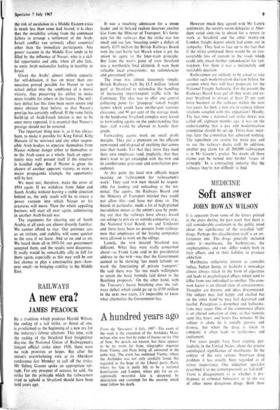A new era?
RAILWAYS JAMES PEACOCK
By a tradition which predates Harold Wilson, the ending of a rail strike, or threat of one, is proclaimed as the beginning of a new era for the industry's labour relations. This time, with the ending of the Stratford East freightliner dispute, the National Union of Railwaymen's longest official strike since 1926, there were no rash promises or hopes. But after the union's overwhelming vote at its Aberdeen conference last Monday to call off the strike, Mr Sidney Greene spoke an appropriate epi- taph. For any prospect of success, he said, the strike for the principle which the railwaymen tried to uphold at Stratford should have been held years ago. It was a touching admission for a union leader and its belated realism deserves another kiss from the Minister of Transport. It's fortu- nate for the railways that the strike was too small and too late. Sweating under a deficit of nearly £135 million the British Railways Board won the real battle last March when it got the union to agree to the liner-train principle. But from the men's point of view Stratford was a worthwhile final skirmish. It won them valuable local concessions: no redundancies and guaranteed jobs.
The issue was almost tiresomely simple. British Railways built the £1.5 million 'inland port' at Stratford to rationalise the handling of increasing import-export traffic with the Continent. The idea was to offer one central collecting point for 'groupage' (small freight items) which could have on-the-spot customs clearance, and 90 per cent of the storage sheds in the handsome Stratford complex were leased to forwarding agents on the understanding that their staff would be allowed to handle their goods.
Forwarding agents work on small profit margins. They put a premium on the efficient turn-round and disposal of anything that comes into their hands. For that they insist they need their own employees (and, implicitly, that they don't want to get entangled with the Nun and its cumbersome grievance and conciliation pro- cedures).
At this point the local NUR officials began insisting on 'railwaymen for railwaymen's work.' They said NUR men should be respon- sible for loading and unloading at the ter- minal. The agents, the Railways Board and the Ministry of Transport insisted they could not allow this—and have not done so. The board, in particular, made a lot of high-pitched incredulous noises at the union's case by point- ing out that the railways have always leased out sidings to private or outside companies (e.g., the National Coal Board, Ici and Unilever) and there have been no protests from railway- men that employees of the leasing companies were allowed to work on the sidings.
Lamely, the NUR insisted Stratford was different. What they were really concerned about—as Frank Lane said in his presidential address to the NUR—was that the Government seemed to be showing 'too much latitude to- ward the functioning of private transport.' He said there was 'far too much willingness to retain the basic formula laid down in the Beeching proposals.' On the other hand, with the Treasury's heavy breathing over the rail- ways deficit which could go up to £150 million in the next two years, it's impossible to know what alternative the Government has.
However much they agreed with Mr Lane's sentiments, the seventy-seven delegates at Aber- deen voted sixty-six to eleven for a return to work at Stratford and the other twenty-six London freight depots which had come out in sympathy. They had to face up to the fact that if the strike continued there would be an irre- coverable loss of custom to the roads which could only mean further redundancies for rail- waymen. For them it was a melancholy and inevitable decision.
Railwaymen are unlikely to be asked to take another such modernisation decision before the autumn when they will hear proposals for the National Freight Authority. For the present the Railways Board have got all they want and ex- pect Stratford to attract at least 25 per cent more business to the railways within the next two years. So then, a new era in railway labour relations coupled with this expansion? Hardly. The last time a national rail strike threat was called off, eighteen months ago, it was on the understanding that a pay and modernisation committee should be set up. Thirty-four meet- ings later the committee has achieved nothing. The signalmen are restive for more pay and so are the railways docks staff. In addition, another pay claim for all 260,000 railwaymen is in Mr Greene's pocket. No doubt all these claims can be turned into further 'issues of principle.' In a contracting industry like the railways they're not difficult to find.






































 Previous page
Previous page